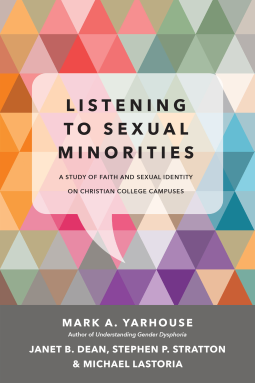
Listening to Sexual Minorities
A Study of Faith and Sexual Identity on Christian College Campuses
by Mark A. Yarhouse; Janet B. Dean; Stephen P. Stratton; Michael Lastoria
This title was previously available on NetGalley and is now archived.
Send NetGalley books directly to your Kindle or Kindle app
1
To read on a Kindle or Kindle app, please add kindle@netgalley.com as an approved email address to receive files in your Amazon account. Click here for step-by-step instructions.
2
Also find your Kindle email address within your Amazon account, and enter it here.
Pub Date Apr 24 2018 | Archive Date May 02 2018
InterVarsity Press | IVP Academic
Talking about this book? Use #ListeningToSexualMinorities #NetGalley. More hashtag tips!
Description
Students arrive on campus with various boxes of belongings to unpack, some heavy, some tidy, some more valuable, some more private. For many students, two of these boxes could be labeled "My Faith" and "My Sexuality"—and these two can be among the most cumbersome to handle. How to balance the two without having to set one down? How to hold them both closely, both securely, but still move forward to settle in with new friends in a new environment? How to keep from dropping one or the other, spilling its embarrassing contents for all to see?Such can be the struggle for any student, but especially for any sexual minority who identifies or struggles with an LGB+ identity or same-sex attraction on a Christian college campus. For these students their faith and their sexuality often feel both tender and in acute tension. Who is God making them to be? What do they need to grow in to develop faithfully, and what might they need to leave behind? How can they truly flourish?The research team of Yarhouse, Dean, Stratton, and Lastoria draw on their decades of experience both in the psychology of sexual identity and in campus counseling to bring us the results of an original longitudinal study into what sexual minorities themselves experience, hope for, and benefit from. Rich with both quantitative and qualitative data, their book gives an unprecedented opportunity to listen to sexual minorities in their own words, as well as to observe patterns and often surprising revelations about life and personal development both on campus and after graduation.Listening to Sexual Minorities will be an indispensable resource not only for counselors and psychologists but also for faculty, student-development leaders, and administrators in higher education as well as leaders in the church and wider Christian community who want to create an intentional environment to hear from and contribute to the spiritual flourishing of all.
Christian Association for Psychological Studies (CAPS) Books explore how Christianity relates to mental health and behavioral sciences including psychology, counseling, social work, and marriage and family therapy in order to equip Christian clinicians to support the well-being of their clients.
Advance Praise
"Just as a plane requires both wings to fly, so too the gospel cannot soar in a culture without the two wings of truth and grace. No other issue confronting the twenty-first-century church in America requires the need for both wings than the intersection of human sexuality and genuine Christian faith. Without sacrificing the wing of truth, Listening to Sexual Minorities helps lift the wing of grace. Where the church has excelled at telling, this book excels at listening. Thankfully, Listening to Sexual Minorities is not a theological or political treatise telling believers what they should believe or do. Gratefully, it is an archive of conversations, thoughts, and feelings, gleaned from individuals within our churches and institutions."
-Jon S. Kulaga, president of Ohio Christian University
"For more than forty years I’ve worked with college students. The complexities of the issues they deal with personally are exciting, challenging and (at times) overwhelming. Some of the most difficult issues they face are found at the intersection of faith and sexuality. Within the Christian university context those intersecting issues take on an additional dimension for LGB+ students because of the cultural tensions surrounding these issues. Listening to Sexual Minorities is a gold mine of research, wisdom, and practical application in understanding more accurately the journeys of sexual minority students. The student stories embedded in each chapter range from encouraging to heart wrenching. For campuses seeking to take both faith and sexuality seriously, working through Listening to Sexual Minorities will be time well spent."
-Jay Barnes, president of Bethel University
"The research and insight found in Listening to Sexual Minorities: A Study of Faith and Sexual Identity on Christian College Campuses is profoundly timely and relevant—not just for Christian educators, but for all of us who are committed to loving and sharing life with the many sexual minority individuals in our families, churches, and communities. One of the greatest hindrances to this end is that although many strong opinions abound, there are few opportunities to listen and bear witness to the actual stories, experiences, and complexities of our sexual minority friends and colleagues—especially those who are professing Christians. Yarhouse, Dean, Stratton, and Lastoria have assembled a scholarly, comprehensive, readable, and human introduction to the stories of such individuals; I highly recommend it because the world needs to hear what they have to say."
-David C. Wang, associate professor of psychology at Rosemead School of Psychology, editor of the Journal of Psychology and Theology
"Professor Mark Yarhouse and his collaborators continue their remarkable efforts to produce informative, original, and even-handed empirical research into the life experiences of Christians experiencing same-sex and other non-normative sexual attractions. This book reports on the results of a study of remarkable breadth and comprehensiveness. It offers understandable syntheses of the complex findings and wise, biblical suggestions based on the findings for implementation by Christian educational institutions and churches. It is a unique and valuable contribution deserving the attention of thoughtful Christian leaders everywhere."
-Stanton L. Jones, professor of psychology at Wheaton College, coauthor of God’s Design for Sex
"This groundbreaking book is a must-read for all who care about faith-based schools and the LGBTQ students who are a part of these communities."
-Pat Griffin, Professor Emerita at University of Massachusetts Amherst and member of the NCAA Seeking Common Ground Leadership Team
Available Editions
| EDITION | Other Format |
| ISBN | 9780830828623 |
| PRICE | $36.99 (USD) |
Links
Featured Reviews
A set of findings and explanation of findings regarding the life, faith, health, outlook, and situation of students who identify as sexual minorities at Christian colleges.
The authors cite their own studies as well as other studies done in the field to assess the condition of sexual minorities on Christian college campuses. They define sexual minorities as those who self identify as LGBTQ or questioning. They interviewed a set of them twice over the period of a couple of years to assess any changes which may have taken place. The issues covered everything from how they had come to believe/accept their sexuality, how they came to identify the way they did sexually, why they came to a Christian college, their faith and its standing in light of their sexuality, how well or poorly they felt accepted, the resources available to them, their mental health, and how well they transitioned out of the Christian college environment into another college or into the workplace.
The results are not necessarily what one would expect. Many of the students maintained their faith and wished to find ways to honor their faith while living with their sexuality. Few students expected the schools to change or adapt their general stance toward sexual behaviors; they instead wished for greater resources to be able to work through issues relating to their sexuality and not be marginalized on account of them. Over time more and more are finding greater acceptance and awareness of the situation; overall it seems many Christian colleges are attempting to work with the times in terms of helping sexual minority students while upholding their standards regarding sexual behavior.
The framework of identity, disability, and vocation seems to have value. The work is dense with statistics, display of evidence, and sociological terminology, making it a bit more challenging to read, but beneficial inasmuch one can see the ground upon which the authors are making their conclusions and recommendations.
A worthwhile read to be able to learn more about how young people seek to be faithfully Christian while grappling with their sexuality.













